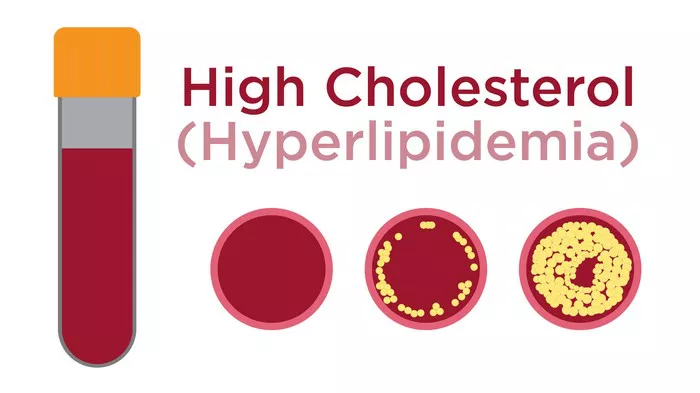Cholesterol is a waxy substance found in your blood. While your body needs cholesterol to build healthy cells, having high levels of cholesterol can increase your risk of heart disease. High cholesterol often doesn’t cause any symptoms, so it’s essential to monitor your levels regularly through blood tests. However, there are some warning signs that may indicate high cholesterol levels. In this article, we’ll explore the ten warning signs of high cholesterol that you should be aware of.
1. Chest Pain or Angina
One of the most common warning signs of high cholesterol is chest pain or angina. This pain can feel like pressure, squeezing, fullness, or a burning sensation in the chest area. It occurs when your heart muscle doesn’t get enough oxygen-rich blood due to narrowed arteries, often caused by high cholesterol buildup (atherosclerosis). If you experience chest pain, especially during physical activity or stress, it’s crucial to seek medical attention promptly.
2. Shortness of Breath
High cholesterol can lead to a condition called coronary artery disease (CAD), where plaque buildup in the arteries restricts blood flow to the heart. This reduced blood flow can cause shortness of breath, especially during exertion or when lying flat. If you notice sudden or worsening shortness of breath, it could be a sign of underlying heart issues due to high cholesterol.
3. Fatigue or Weakness
Feeling unusually tired or weak, even after adequate rest, can be another warning sign of high cholesterol. When cholesterol levels are high, it can affect blood circulation and oxygen delivery to your muscles and tissues, leading to fatigue and weakness. If you’re experiencing persistent fatigue without an apparent cause, consider discussing it with your healthcare provider and getting your cholesterol levels checked.
4. Yellowish Deposits on Skin
High cholesterol can sometimes manifest externally as yellowish deposits on your skin, known as xanthomas. These deposits typically appear on the elbows, knees, hands, feet, or around the eyes (xanthelasma). Xanthomas are fatty deposits that form when cholesterol levels are elevated, and they can vary in size and appearance. While not everyone with high cholesterol develops xanthomas, their presence may indicate a need for cholesterol-lowering interventions.
5. Frequent Indigestion or Nausea
Digestive issues like frequent indigestion, bloating, or nausea can be associated with high cholesterol levels. Excess cholesterol can affect bile production and flow, leading to digestive discomfort. Additionally, high cholesterol may contribute to gallstones, which can cause symptoms like abdominal pain, bloating, indigestion, and nausea. If you’re experiencing persistent digestive problems, consider discussing them with your doctor to rule out underlying cholesterol-related issues.
6. Difficulty Walking or Leg Pain
Peripheral artery disease (PAD) is a condition where narrowed arteries reduce blood flow to your limbs, typically the legs. High cholesterol can contribute to PAD by causing atherosclerosis in leg arteries. Symptoms may include leg pain, cramping, numbness, weakness, or difficulty walking (claudication). These symptoms often worsen with physical activity and improve with rest. If you’re experiencing persistent leg pain or difficulty walking, especially during exercise, it’s essential to consult a healthcare professional.
7. Vision Changes
High cholesterol can impact eye health and lead to vision changes. One common manifestation is a condition called corneal arcus, where a white or gray ring forms around the cornea due to cholesterol deposits. Additionally, cholesterol buildup in the blood vessels supplying the eyes can increase the risk of retinal artery or vein occlusion, leading to vision loss or changes. If you notice any sudden or unexplained changes in your vision, it’s crucial to have your eyes examined by an eye care specialist.
8. Frequent Headaches
While headaches can have various causes, they can sometimes be linked to high cholesterol levels. High cholesterol can contribute to atherosclerosis, including in the blood vessels supplying the brain. This narrowing or blockage of brain arteries can lead to reduced blood flow and oxygen to the brain, triggering headaches. If you’re experiencing frequent or severe headaches, especially accompanied by other symptoms like dizziness or visual changes, consult your healthcare provider for an evaluation.
9. Cognitive Issues
Some studies suggest a potential link between high cholesterol levels and cognitive decline or dementia. The buildup of cholesterol plaques in blood vessels, including those in the brain, may contribute to vascular dementia or increase the risk of Alzheimer’s disease. Cognitive issues related to high cholesterol may include memory problems, confusion, difficulty concentrating, or changes in behavior. If you or a loved one notice cognitive changes, especially in conjunction with other risk factors for heart disease, it’s crucial to seek medical advice promptly.
10. Erectile Dysfunction
High cholesterol can also affect sexual health, particularly in men. Erectile dysfunction (ED) is often linked to cardiovascular health, including cholesterol levels. Reduced blood flow due to narrowed arteries, a common consequence of high cholesterol, can contribute to ED by hindering adequate blood supply to the genitals during arousal. Addressing underlying cholesterol issues through lifestyle changes or medication may help improve ED symptoms in some cases.
In conclusion, high cholesterol is a significant risk factor for heart disease, and early detection is crucial for effective management. While high cholesterol typically doesn’t cause noticeable symptoms, being aware of these warning signs can prompt timely medical intervention and lifestyle modifications. Regular cholesterol screenings, maintaining a healthy diet, engaging in regular physical activity, managing stress, and following your healthcare provider’s recommendations are essential steps in maintaining heart health and reducing the risk of complications associated with high cholesterol. If you experience any of these warning signs or have concerns about your cholesterol levels, consult your healthcare provider for personalized guidance and treatment.


